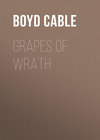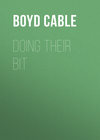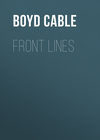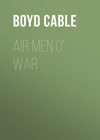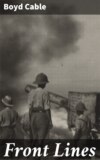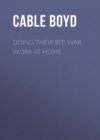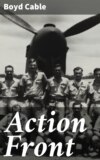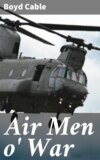Read the book: «Grapes of wrath», page 4
“Oh, come on an’ leave it alone,” growled the first, and heaved himself over the parapet. The other followed, but paused to look back at Billy. “Good job the early bird don’t ’appen to be about this mornin’,” he remarked loudly, “or ’e might catch you,” and he and his companion vanished.
“What’s the good of grousing at them, Billy?” said Larry. “They’ve got to get up somehow.” He was a little inclined to be angry with Billy, partly because they were all more or less involved in the foolish complaint, and partly no doubt just because he was ready to be angry with any one or anything.
“Why do they all come over this bit of trench, then?” demanded Billy. “And I’m damned if ’ere ain’t more of ’em. Now wot d’you suppose he’s playin’ at?”
“They’re Gunners,” said Larry, “laying a telephone wire out, evidently.”
A young officer, a Second Lieutenant, and two men crept round the broken corner of the trench. One of the men had a reel of telephone wire, which he paid out as he went, while the other man and the officer hooked it up over projections in the trench wall or tucked it away along the parts that offered the most chance of protection. The officer turned to the three men who crouched in the trench watching them.
“Isn’t there a communication trench somewhere along here?” he asked, “one leading off to the right to some broken-down houses?”
“We don’t know, sir,” said Larry. “We haven’t been further along than this, or any further up.”
“The men going up to the front line all say the communication trenches are too badly smashed, and under too hot and heavy a fire to be used,” said Kentucky; “most of them go up and down across the open from here.”
“No good to me,” said the officer. But he stood up and looked carefully out over the ground in front.
“No good to me,” he repeated, stepping back into the trench. “Too many shells and bullets there for my wire to stand an earthly. It would be chopped to pieces in no time.”
“Look out, sir,” said Larry hurriedly; “there comes another one.”
The officer and his two men stooped low in the trench, and waited until the customary rush had ended in the customary crash.
“That,” said the officer, standing up, “was about a five-point-nine H.E., I reckon. It’s mostly these six-and eight-inch they have been dumping down here all the morning.”
He and his men went on busily with their wiring, and before they moved off into the next traverse he turned to give a word of warning to the infantrymen to be careful of his wire, and to jump on any one they saw pulling it down or trampling on it.
“Lots of fellows,” he said, “seem to think we run these wires out for our own particular benefit and amusement, but they howl in a different tune if they want the support of the guns and we can’t give it them because our wire back to the battery is broken.”
The three regarded the slender, wriggling wire with a new interest after that, and if the rest of the trench full of Stonewalls were as zealous in their protection as they were, there was little fear of the wire being destroyed, or even misplaced, by careless hands or feet.
Billy Simson cursed strenuously a pair of blundering stretcher-bearers when one of their elbows caught the wire and pulled it down. “’Ow d’yer suppose,” he demanded, “the Gunners’ Forward Officer is goin’ to tell ’is guns back there to open fire, or keep on firin’, if yer go breakin’ up ’is blinkin’ wire?” And he crawled up and carefully returned the wire to its place.
“Look out,” he kept saying to every man who came and went up and down or across the trench. “That’s the Gunners’ wire; don’t you git breakin’ it, or they can’t call up to git on with the shellin’.”
About two or three hours after dawn the German bombardment appeared to be slackening off, but again within less than half an hour it was renewed with a more intense violence than ever. The Stonewalls’ trench was becoming hopelessly destroyed, and the casualties in the battalion were mounting at serious speed.
“Hotter than ever, isn’t it?” said Larry, and the other two assented.
“We’re lucky to ’ave dodged it so far,” said Billy Simson; “but by the number o’ casualties we’ve seen carted out, the battalion is coppin’ it pretty stiff. If we stop ’ere much longer, there won’t be many of us left to shove into the front line, when we’re needed.”
“D’ye notice,” said Kentucky, “that the rifle firing and bombing up in front seems to have eased off a bit, and the guns are doing most of the work?”
“Worse luck,” said Larry, “I’d sooner have the bullets than the shells any day.”
“Ar’n’t you the Stonewalls?” suddenly demanded a voice from above them, and the three looked up to see a couple of men standing on the rearward edge of the trench.
“Yes, that’s right,” they answered in the same breath, and one of the men turned and waved his hand to the rear.
“Somebody is lookin’ for you,” he remarked, jumping and sliding down into the trench. “C Company o’ the Stonewalls, ’e wanted.”
“That’s us,” said Larry, “but if he wants an officer he must go higher up.”
Another figure appeared on the bank above, and jumped hastily down into the trench.
“Stonewalls,” he said. “Where’s ‘C’ – why ’ere yer are, chums – ”
“Pug?” said Larry and Kentucky incredulously. “We thought that – why, weren’t you hit?” “Thought you was ’alf-way to Blighty by now,” said Billy Simson.
“You were hit, after all,” said Larry, noticing the bloodstains and the slit sleeve on Pug’s jacket.
“’It?” said Billy Simson, also staring hard. “Surely they didn’t send yer back ’ere after bein’ casualtied?”
“Give a bloke ’alf a chance to git ’is wind,” said Pug, “an’ I’ll spin yer the cuffer. But I’m jist about puffed out runnin’ acrost that blinkin’ field, and dodgin’ Jack Johnsons. Thought I was niver goin’ to find yer agin; bin searchin’ ’alf over France since last night, tryin’ to ’ook up with yer. Where’ve you bin to, any’ow?”
“Bin to!” said Billy Simson, indignantly. “We’ve bin now’ere. We’ve bin squatting ’ere freezin’ and drownin’ to death – them that ’aven’t bin wiped out with crumps.”
“We came straight across from where we left you to the old German trench,” said Larry, “then up a communication trench to here, and, as Billy says, we’ve stuck here ever since.”
“An’ ’ere,” said Pug, “I’ve bin trampin’ miles lookin’ for yer, and every man I asked w’ere the Stonewalls was told me a new plice.”
“But what happened, Pug?” said Kentucky. “You were wounded, we see that; but why ar’n’t you back in the dressing station?”
“Well,” said Pug, hesitatingly, “w’en I got this puncture, I dropped back in the trench. I didn’t know w’ether it was bad or not, but one of our stretcher-bearers showed me the way back to the fust aid post. They tied me up there, and told me the wound wasn’t nothin’ worth worritin’ about, and after a few days at the Base I’d be back to the battalion as good as ever; so I ’ad a walk round outside, waitin’ till the ambulance come that they said would cart me back to the ’orspital train, and w’en nobody was lookin’ I jist come away, and found my way back to w’ere yer lef’ me. Then I chased round, as I’ve told yer, till I found yer ’ere.”
“Good man,” said Larry, and Kentucky nodded approvingly.
Billy Simson didn’t look on it in the same light. “You ’ad a chance to go back, and you come on up ’ere agin,” he said, staring hard at Pug. “For God’s sake, what for?”
“Well, yer see,” said Pug, “all the time I’ve bin out ’ere I’ve never ’ad a chance to see the inside of a German trench; an’ now there was a fust class chance to git into one, an’ a chance maybe of pickin’ up a ’elmet for a soo-veneer, I thought I’d be a fool not to take it. You ’aven’t none of yer found a ’elmet yet, ’ave yer?” and he looked inquiringly round.
“’Elmet,” said Billy Simson disgustedly. “Blowed if yer catch me comin’ back ’ere for a bloomin’ ’undred ’elmets. If I’d bin you, I’d a bin snug in a ’ospital drinkin’ beef tea, an’ smokin’ a fag by now.”
“Ah!” said Pug profoundly. “But w’at good was a week at the Base to me?”
“You would ’ave missed the rest of this rotten show, any’ow,” said Billy.
“That’s right,” assented Pug, “and I might ’ave missed my chance to pick up a ’elmet. I want a blinkin’ ’elmet – see – and wot’s more, I’m goin’ to git one.”
CHAPTER VII
BLIND MAN’S BUFF
The Sergeant stumbled round the corner of the traverse and told the four men there that the battalion was moving along the trench to the right, and to “get on and follow the next file.” They rose stiffly, aching in every joint, from their cramped positions, and plodded and stumbled round the corner and along the trench. They were all a good deal amazed to see the chaotic state to which it had been reduced by the shell fire, and not only could they understand plainly now why so many casualties had been borne past them, but found it difficult to understand why the number had not been greater.
“By the state of this trench,” said Larry, “you’d have thought a battalion of mice could hardly have helped being blotted out.”
“It licks me,” agreed Kentucky; “the whole trench seems gone to smash; but I’m afraid there must have been more casualties than came past us.”
“Look out!” warned Billy Simson, “’ere’s another,” and the four halted and crouched again until the shell, which from the volume of sound of its coming they knew would fall near, burst in the usual thunder-clap of noise and flying débris of mud and earth. Then they rose again and moved on, and presently came to a dividing of the ways, and a sentry posted there to warn them to turn off to the left. They scrambled and floundered breathlessly along it, over portions that were choked almost to the top by fallen earth and rubble, across other parts which were no more than a shallow gutter with deep shell craters blasted out of it and the ground about it. In many of these destroyed portions it was almost impossible, stoop and crouch and crawl as they would and as they did, to avoid coming into view of some part of the ground still held by the Germans, but either because the German guns were busy elsewhere, or because the whole ground was more or less veiled by the haze of smoke that drifted over it and by the thin drizzle of rain that continued to fall, the battalion escaped any concerted effort of the German guns to catch them in their scanty cover. But there were still sufficient casual shells, and more than sufficient bullets about, to make the passage of the broken trench an uncomfortable and dangerous one, and they did not know whether to be relieved or afraid when they came to a spot where an officer halted them in company with about a dozen other men, and bade them wait there until he gave the word, when they were to jump from the trench and run straight across the open to the right, about a hundred yards over to where they would find another trench, better than the one they were now occupying, then to “get down into it as quick as you can, and keep along to the left.” They waited there until a further batch of men were collected, and then the officer warned them to get ready for a quick run.
“You’ll see some broken-down houses over there,” he said; “steer for them; the trench runs across this side of them, and you can’t miss it. It’s the first trench you meet; drop into it, and, remember, turn down to the left. Now – no, wait a minute.”
They waited until another dropping shell had burst, and then at the quick command of the officer jumped out and ran hard in the direction of the broken walls they could just see. Most of the men ran straight without looking left or right, but Kentucky as he went glanced repeatedly to his left, towards where the German lines were. He was surprised to find that they were evidently a good way off, very much further off, in fact, than he had expected. He had thought the last communication trench up which they moved must have been bringing them very close to our forward line, but here from where he ran he could see for a clear two or three hundred yards to the first break of a trench parapet; knew that this must be in British hands, and that the German trench must lie beyond it again. He concluded that the line of captured ground must have curved forward from that part behind which they had spent the night, figured to himself that the cottages towards which they ran must be in our hands, and that the progress of the attack along there had pushed further home than they had known or expected.
He thought out all these things with a sort of secondary mind and consciousness. Certainly his first thoughts were very keenly on the path he had to pick over the wet ground past the honeycomb of old and new shell holes, over and through some fragments of rusty barbed wire that still clung to their broken or uptorn stakes, and his eye looked anxiously for the trench toward which they were running, and in which they would find shelter from the bullets that hissed and whisked past, or smacked noisily into the wet ground.
There was very little parapet to the trench, and the runners were upon it almost before they saw it. Billy Simson and Larry reached it first, with Pug and Kentucky close upon their heels. They wasted no time in leaping to cover, for just as they did so there came the rapid rush-rush, bang-bang of a couple of Pip-Squeak shells. The four tumbled into the trench on the instant the shells burst, but quick as they were, the shells were quicker. They heard the whistle and thump of flying fragments about them, and Billy Simson yelped as he fell, rolled over, and sat up with his hand reaching over and clutching at the back of his shoulder, his face contorted by pain.
“What is it, Billy?” said Larry quickly.
“Did it get you, son?” said Kentucky.
“They’ve got me,” gasped Billy. “My Christ, it do ’urt.”
“Lemme look,” said Pug quickly. “Let’s ’ave a field-dressin’, one o’ yer.”
Simson’s shoulder was already crimsoning, and the blood ran and dripped fast from it. Pug slipped out a knife, and with a couple of slashes split the torn jacket and shirt down and across.
“I don’t think it’s a bad ’un,” he said. “Don’t seem to go deep, and it’s well up on the shoulder anyway.”
“It’s bad enough,” said Billy, “by the way it ’urts.”
Kentucky also examined the wound closely.
“I’m sure Pug’s right,” he said. “It isn’t anyways dangerous, Billy.”
Billy looked up suddenly. “It’s a Blighty one, isn’t it?” he said anxiously.
“Oh, yes,” said Kentucky; “a Blighty one, sure.”
“Good enough,” said Billy Simson. “If it’s a Blighty one I’ve got plenty. I’m not like you, Pug; I’m not thirstin’ enough for Germ ’elmets to go lookin’ any further for ’em.”
One of the sergeants came pushing along the trench, urging the men to get a move on and clear out before the next lot ran across the open for the shelter.
“Man wounded,” he said, when they told him of Billy Simson. “You, Simson! Well, you must wait ’ere, and I’ll send a stretcher-bearer back, if ye’re not able to foot it on your own.”
“I don’t feel much up to footin’ it,” said Billy Simson. “I think I’ll stick here until somebody comes to give me a hand.”
So the matter was decided, and the rest pushed along the narrow trench, leaving Simson squatted in one of the bays cut out of the wall. The others moved slowly along to where their trench opened into another running across it, turned down this, and went wandering along its twisting, curving loops until they had completely lost all sense of direction.
The guns on both sides were maintaining a constant cannonade, and the air overhead shook continually to the rumble and wail and howl of the passing shells. But although it was difficult to keep a sense of direction, there was one thing always which told them how they moved – the rattle of rifle fire, the rapid rat-tat-tatting of the machine guns and sharp explosions of bombs and grenades. These sounds, as they all well knew, came from the fighting front, from the most advanced line where our men still strove to push forward, and the enemy stood to stay them, or to press them back.
The sound kept growing ominously louder and nearer the further the Stonewalls pushed on along their narrow trench, and now they could hear, even above the uproar of the guns and of the firing lines, the sharp hiss and zipp of the bullets passing close above the trench, the hard smacks and cracks with which they struck the parapet or the ground about it. The trench in which they moved was narrow, deep, and steep-sided. It was therefore safe from everything except the direct overhead burst of high-explosive shrapnel, and of these there were, for the moment, few or none; so that when the men were halted and kept waiting for half an hour they could see nothing except the narrow strip of sky above the lips of the trench, but could at least congratulate themselves that they were out of the inferno in which they had spent the night and the early part of the morning. It was still raining, a thin, cold, drizzling rain, which collected in the trench bottom and turned the path into gluey mud, trickled down the walls and saturated them to a sticky clay which daubed the shoulders, the elbows, the hips, and haversacks of the men as they pushed along, coated them with a layer of clinging, slimy wetness, clammy to the touch, and striking them through and through with shivering chills. When they halted most of the men squatted down in the bottom of the trench, sitting on their heels and leaning their backs against the walls, and waited there, listening to the near-by uproar of the conflict, speculating on how little or how long a time it would be before they were into it actively; discussing and guessing at the progress the attack had made, and what ground had been taken, and held or lost. Here and there a man spoke of this point or that which the attack had reached, of some village or hill, or trench, which he heard had been taken. Usually the information had been gleaned from wounded men, from the stretcher-bearers and ammunition carriers with whom the Stonewalls had spoken, as they crossed and recrossed their trench early that morning.
In the trench they now occupied they gleaned no further news, because none of these wayfarers to and from the firing-line passed their way.
“Our front line can’t be getting pushed very hard,” suggested Larry; “because if they were, they’d have shoved us in support before now.”
“It looks to me,” said Kentucky, “that they have slid us off quite a piece to the right of where we were meant to go. What lot of ours do you suppose is in these trenches in front of us now?” But of that nobody had any definite opinion, although several made guesses, based on the vaguest rumors, and knowledge of this regiment or that which had gone up ahead of them.
“’Ark at the Archies,” said Pug suddenly. “They’re ’avin’ a busy season on somebody. D’yer think they’re ours, or the ’Uns’?”
“I don’t know,” said Kentucky, “but I fancy I hear the ’planes they’re shooting at.”
He was right, and presently they all heard the faint but penetrating whirr of an aeroplane’s engines, even above the louder and deeper note of the cannonade and rifle fire.
“There she is,” said Larry. “Can you see the marks on her?”
“It’s ours,” said Kentucky. “I see the rings plain enough.”
Although the aeroplane was at a good height, there were several who could distinguish the bull’s-eye target pattern of the red, white and blue circles painted on the wings and marking the aeroplane as British. For some time it pursued a course roughly parallel to the line of the trench, so that the Stonewalls, craning their heads back, could follow its progress along the sky, and the trailing wake of puffing smoke from the shrapnel that followed it. They lost sight of it presently until it curved back into the range of their vision, and came sailing swiftly over them again. Then another ’plane shot into view above them, steering straight for the first, and with a buzz of excited comment the Stonewalls proclaimed it a Hun and speculated keenly on the chances of a “scrap.”
There was a “scrap,” and in its opening phases the Stonewalls had an excellent view of the two machines circling, swooping, soaring, and diving in graceful, bird-like curves. The “Archies” ceased on both sides to fling their shrapnel at the airy opponents, because with their swift dartings to and fro, and still more because of their proximity to one another, the Archie gunners were just as liable to wing their own ’plane and bring it down, as they were to hit the enemy one. For two or three minutes the Stonewalls watched with the wildest excitement and keenest interest the maneuvering of the two machines. Half a dozen times a gasp or a groan, or a chorus of comment “He’s hit,” and “He’s downed,” and “He’s got him,” followed some movement, some daring plunge or nose dive of one or other of the machines; but always before the exclamations had finished the supposed injured one had righted itself, swooped and soared upward again, and swung circling into its opponent.
Once or twice the watchers thought they could catch the faint far-off rattle of the aeroplanes’ machine guns, although amongst the other sounds of battle it was difficult to say with any certainty that these shots were fired in the air; but just when the interest and excitement were at their highest, a sharp order was passed along the trench for every man to keep his face down, on no account to look upwards out of the trench, and officers and sergeants, very reluctantly setting the good example by stooping their own heads, pushed along the trench to see that the men also obeyed the order.
“Blinkin’ sell, I calls it,” exclaimed Pug disgustedly. “The fust decent scrap between two ’planes I’ve ever ’ad a chance to see, and ’ere I’m not allowed to look at it.”
“You wait until you get ’ome, and see it on the pictures,” said the Sergeant, who stood near them. “It’ll be a sight safer there. If you don’t know you ought to, that a trench full of white faces lookin’ up at a ’plane, is as good as sending a postcard to their spotter upstairs sayin’ the trench is occupied in force; and I don’t suppose,” he concluded, “you’re any more anxious than I am for that ’Un to be sendin’ a wireless to his guns, and ’avin’ this trench strafed like the last one was.”
“From what I can see of it,” said Pug, “that ’Un up there was ’avin’ ’is ’ands too full to worrit about wot was goin’ on down ’ere.”
“Well, anyhow,” said the Sergeant, “you needn’t keep yer eyes down lookin’ for sixpences any longer. Both the ’planes is out of sight.”
“Well, I’m blowed,” said Pug, “if that’s not a sickener. ’Ere we ’as a fust-class fight, and us in the front seats for seein’ it, and they goes and shifts off so we don’t even know which side won.”
And they never did. A minute later the anti-aircraft guns broke out into fire again, their peculiar singing reports easily distinguishable from the other gun fire, even as the distant reports of their shrapnel bursts in the air were distinguishable from the other sounds of many bursting shells near the ground. But which of the “Archibalds” were firing they did not know. They could only guess that one of the machines had been shot down, and that the anti-aircraft guns of the opposing side were endeavoring to bring down the victor – but which was the victor, and whether he escaped or not, was never known to the Stonewalls.
“Bloomin’ Blind-Man’s-Buff, I calls it,” grumbled Pug. “Gropin’ round after ’Uns you can’t see, an’ gettin’ poked in the ribs without seein’ one – like Billy was.”
